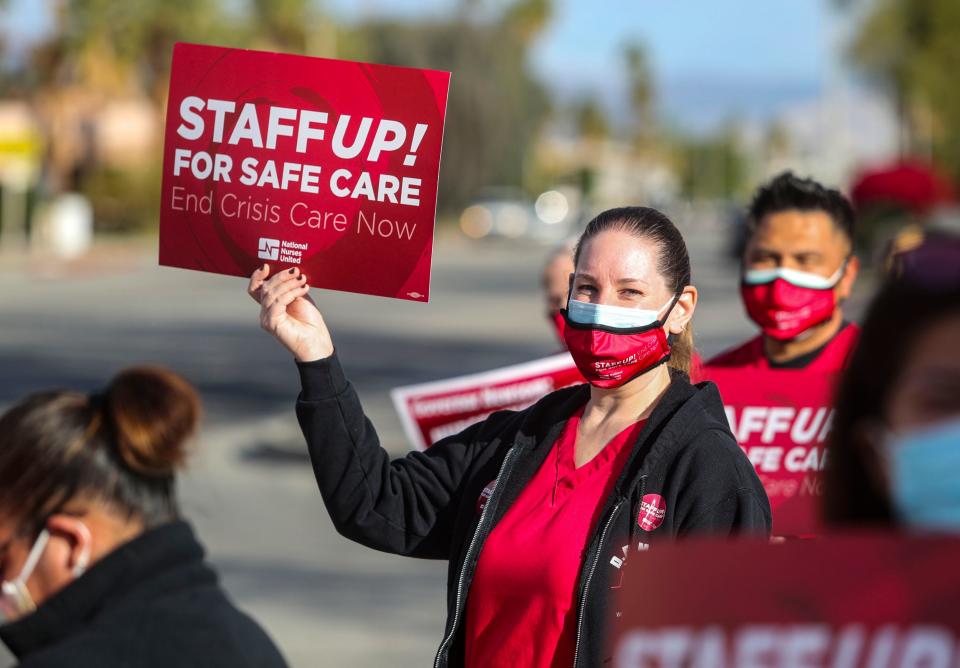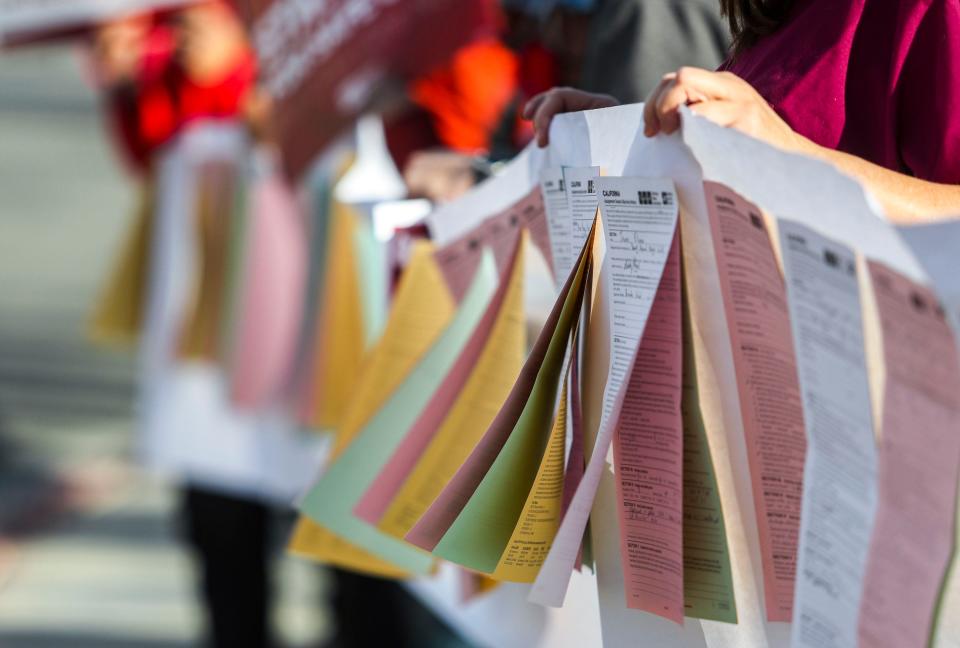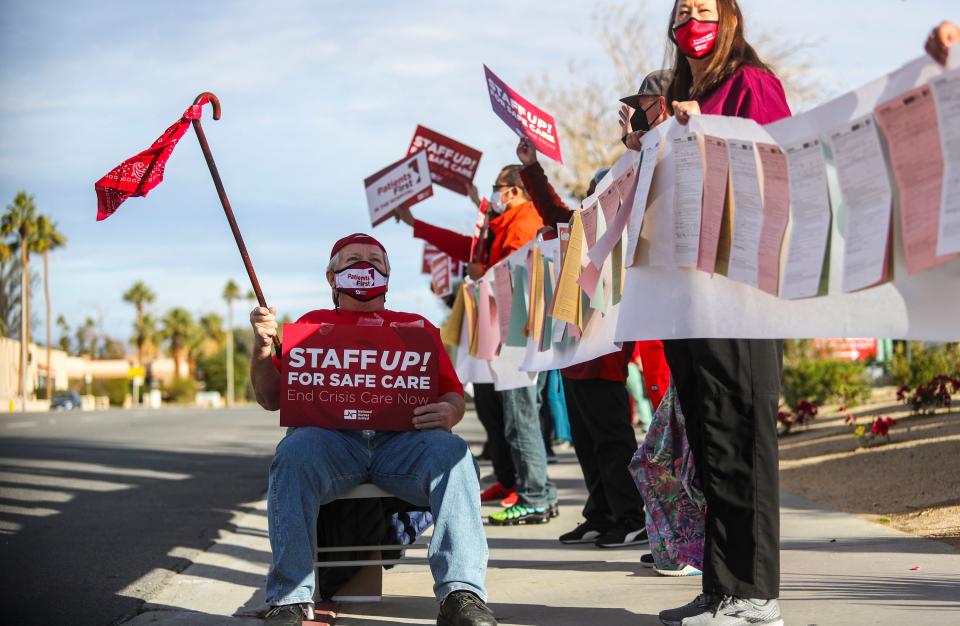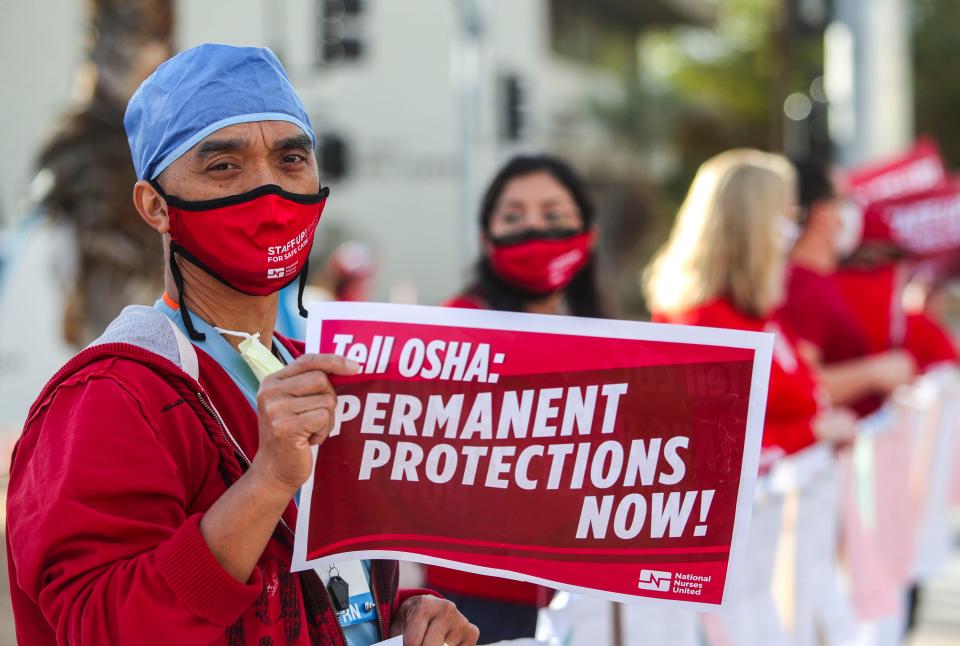Desert Regional Medical Center nurses rally over staffing shortages, conditions
Christina Peterson, a registered nurse at Desert Regional Medical Center, has been in the field for 28 years and always felt that her job has been a "position of honor." But she's "never seen it come down to this."
By "this," she means confusion about directives from administrators, managers and public health bodies; feeling like there's no one to talk to about job concerns or frustrations; and not being able to care for patients as safely as possible because of staffing shortages brought on by COVID-19.
"There's times we're so busy, I feel like I don't even have time to really assess what's going on," she said outside the Palm Springs hospital Thursday morning. "The things you love as a nurse — to give a bath, to talk to your patients, to assess and see how they're doing — sometimes we just barely get these done."
Peterson, along with around 50 nurses represented under the California Nurses Association, participated in a COVID Day of Action rally Thursday morning in front of Desert Regional, voicing their frustrations over staffing shortages and what they alleged wunsafe working conditions caused by COVID-19. It was just one of several demonstrations taking place nationwide Thursday by National Nurses United, the nation’s largest union of registered nurses.

Desert Regional employs around 800 nurses represented by the California Nurses Association, according to spokesperson Todd Burke.
Related: Riverside County reports death of infant from COVID-19, becoming youngest death from virus in county
The local nurses, who all had the day off or had just finished their night shifts, were holding signs demanding hospital administration and the California Department of Public Health "staff up" and "end crisis care."
California is the only state that has, under law, required minimum nurse-to-patient ratios that have to be maintained at all times by unit, according to the American Nurses Association. However, local nurses say those ratios have not been followed throughout the pandemic.
Several demonstrators displayed around 75 Assignment Despite Objection forms that were filed in less than two months. These forms acknowledge that while health care workers still completed tasks that were assigned to them, they did not feel they were safe to do. Many were related to staff-to-patient ratios, such as one employee who was taking care of three patients in the intensive care unit, while California law states the safe ratio is one nurse to two patients.
Linda Serrano, a registered nurse in the trauma department, said she has felt the pressure that comes with caring for too many patients at one time.
"The workload and the need to provide for these patients is very difficult for us," Serrano said. "It becomes demoralizing because we cannot meet all of the needs of all these patients constantly, and there's room for error when we have excess patients: medication errors, delay in stay, inability to monitor as closely as we typically could be."

Serrano said she and her colleagues have met with hospital administration "countless times" to request more staff members. A request has been made to the California Department of Public Health for approximately 25 additional emergency traveling nurses, Burke said.
Read more: COVID-19: Coachella Valley adds 1,610 new cases in past week, six deaths
Related: Coachella Rite Aid store to host Family Immunization Days, no appointments necessary
The state has not fulfilled those requests as quickly as in previous surges, explained Riverside County Emergency Medical Services Director Bruce Barton at Tuesday's Riverside County Board of Supervisors meeting, but nurses are starting to trickle in. The hospital is also starting to see some of those candidates.
Burke said in a statement: "As hospitals across the state continue to experience nursing shortages, we remain committed to doing everything possible to stay well-staffed. Our focus has been and continues to remain on the excellent care we provide our community as well as providing a safe work environment for our employees."
"We deeply appreciate the dedication and professionalism shown by our nurses and other caregivers at Desert Regional Medical Center,” he added.

Nurses also are disappointed in new return-to-work guidelines from the California Department of Public Health for health care workers who test positive for COVID-19. The guidance states health care workers who test positive for COVID-19 and are asymptomatic can return to work "immediately" without isolation or testing. Those who have been exposed and are asymptomatic can also return to work immediately without quarantine or testing. These workers must wear an N95 respirator and preferably work with COVID-19-positive patients, according to the guidance.
The new health order, in place until Feb. 1, is a way to address "critical staffing shortages," according to the state public health department.
Serrano said the directive "does not make sense."
"When we have a nurse who is seated on the floor and comes to work with no symptoms but is COVID-positive, they're taking their break, removing their mask, they're taking a sip of water," she explained, possibly exposing others.
Serrano also noted that many nurses may need to make a "moral, distressing decision": come to work and possibly expose coworkers, or stay home without pay and deal with the financial stress.

Even though nurses are frustrated over working practices, they still want to work in the field and care for the community. But because staffing ratios are not being followed and they're overwhelmed with patients, many fear they will lose their license if they make a mistake on the job.
"If someone's hurt, the nurse is held accountable," said Eugene Stockton, an ICU and trauma nurse. "If your license is put on the line, you can't take care of your family."
He admits there have been times when leaving the field has crossed his mind. In the ICU department, which he said normally has a total of 120 to 130 nurses, 43 colleagues left in the last year. Any given shift needs roughly 22 nurses, but now they're down to about 12 to 13, he said. But Stockton wants to stay because his mind always goes back to one thing: "who will take care of the patients?"
"The community will fall apart without us," Stockton said. "This is our cry for help to the community in hopes that they'll support us."
Eisenhower Health sees shortages of its own
Eisenhower Health in Rancho Mirage is seeing the virus "race through" the staff, according to Chief Medical Officer Dr. Alan Williamson, even though they're vaccinated. All health care workers in California were mandated to be fully vaccinated by Sept. 30, 2021, and now they are also required to receive their booster shot, if eligible, by Feb. 1.
Williamson notes that "very few, if any," infections are spread from patients to hospital staffers.
"The vast majority of them are having relatively mild cases, but they have to be quarantined and that impacts our staffing levels on a daily basis," Williamson said. "We have meetings every single day, in fact usually several times a day, just looking at staffing and how we're going to try to meet the requirements in terms of how many nurses and staff we need on a day-to-day basis to provide care for our patients."
Eisenhower has been successful in recruiting and hiring full-time nurses, Williamson said, as well as utilizing traveling nurses. Just last week, there were 31 new nurses going through orientation, he said.
Not only have staffing shortages impacted employees, but also the daily influx of people coming to emergency rooms or urgent care centers trying to find a COVID-19 test.
If someone does come in to the emergency room suspecting they have COVID-19 or may have been exposed and simply want a test, they are sequestered from other people and have to wait until space opens up.
"Really all they want to do is get tested and then get out of there, but it takes several hours just because of the lineup of people," Williamson said. "It eats up several hours of time and staff time that would otherwise be used to take care of other medical problems."
Related: 'I've tried everywhere': Booked appointments, long lines for COVID-19 testing in Coachella Valley
More: Need a COVID-19 test? Here's where you can get one in the Coachella Valley
An indirect impact that Eisenhower Health has seen throughout the pandemic, and recently has reached critical levels, is inadequate blood supplies. Just recently, there were no supplies left of Type O positive and Type O negative blood. Type O negative is referred to as universal blood type, meaning anyone can receive it, while Type O positive is the most common one, according to the American Red Cross.
People cannot donate blood if they're sick with a cold, flu or fever, and the same goes with COVID-19, Williamson said. Donations have been scarce as more people have been infected with COVID-19. Many healthy individuals have also likely avoided donating in fear of exposure. But Williamson said it's safe to do so.
"The organizations go to extraordinary lengths to be sure that it's safe and sanitary," Williamson said. "If you've been going to the supermarket or drug store or the gas station, you can go donate blood with the same degree of safety, in fact, quite a bit more than that I can assure you."
To learn more about local blood donation opportunities, visit https://www.lstream.org/. Those who donate through Saturday could win a Super Bowl package.
Ema Sasic covers health in the Coachella Valley. Reach her at ema.sasic@desertsun.com or on Twitter @ema_sasic.
This article originally appeared on Palm Springs Desert Sun: Local nurses rally over staff shortages working conditions
